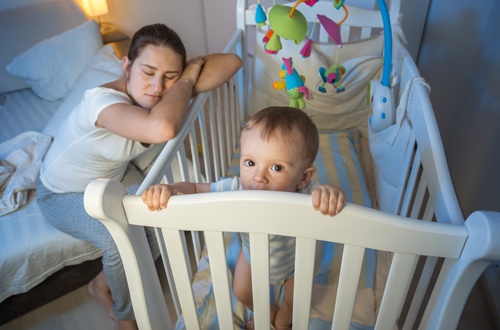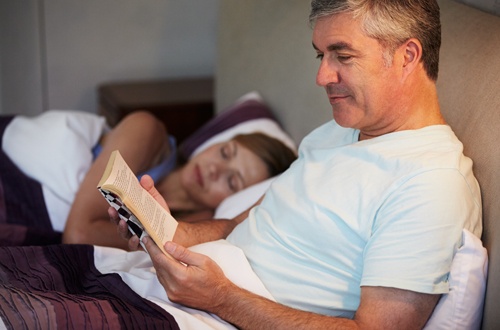Without enough sleep, you’ll be left with impaired memory and cognitive process, weight gain, and decreased work performance and alertness. Kristin Sears shares the facts about sleep, and three tips to help you get the rest you need and deserve.
Since becoming a new parent, I’ve been humbled in many ways. Nothing has been more challenging than trying to get my child to sleep. There are message boards, sleep doctrines and Facebook groups devoted to helping get your kid some quality shuteye. With these groups, I’ve seen the dreaded infographic explaining how often my baby should be sleeping in order to enable proper brain development. It can be frustrating because my baby never seems to meet these minimum standards.
The more I’ve worked on getting my son proper sleep, the less I’ve focused on my own sleep deprivation. I’ve been a crummy sleeper as long as I can remember. I kept the lights on until I was 14 years old when my parents gave me insomnia cassette tapes to play. Nowadays, being sleep deprived because of a waking baby is one thing. But lying awake for no particular reason is as frustrating as it is exhausting.

The Health Consequences of Being Sleep Deprived
According to my dad, Dr. Barry Sears, “The underlying cause of not being able to sleep is constant activation of the central nervous system by stimulants (coffee), stimuli (TV, email, computers, video games, etc), or stress. The hormonal results are increased insulin and cortisol levels that lead to weight gain and fatigue.”
If you can’t correct your troubled sleep habits, you’ll be left with some not-so-fun health effects.
- Impaired Memory and Poor Cognitive Function. So many times I will tell stories I’ve already told. I have to write information down in order to retain it. I always called this having a case of “the stupids.” But the actual technical term is Mild Cognitive Impairment (MCI), and it consists of a decline in memory and thinking skills. Those with MCI can have a higher chance of developing Alzheimer's or another dementia.
- Weight Gain. Even on days with my son where everything goes smoothly, come 7PM, I am completely drained. Activities like working out or cooking a healthy dinner are so challenging now because of my lack of energy. Lack of sleep seems to be related to an increase in hunger, appetite, and obesity. For instance, when I’ve had a bad night’s sleep, the next day I can be ravenous and all the food in the world can’t make me satiated.
- Decreased Work Performance and Alertness. There was a recent report conducted by The RAND Corporation on the economical implications caused by lack of sleep, revealing that sleep deprivation leads to a higher mortality risk and lower productivity levels among the workforce, putting a significant damper on a nation’s economy. According to the report, “the U.S. has the biggest financial losses (up to $411 billion, which is 2.3% of its GDP) and most working days lost (1.2 million) due to sleep deprivation among its workforce.”
Sleep deprivation can also lead to health problems such as high blood pressure, heart disease, and stroke due to increased cortisol levels that reduce immune function, induce insulin resistance, and drive chronic disease development.
So yeah, I definitely needed to cure my issues with sleep.
How to You Can Sleep in Heavenly Peace
Since I have a pretty elaborate bedtime wind down routine for my son, I figured I’d try one for myself to make me drowsy and hopefully lead me to a silent night. Here’s how I did it.
I began listening to my son’s “white noise” album called The Happiest Baby on the Block. It’s basically 6 distinctive tracks of soothing hair dryer tones. Believe it or not, it’s supposed to replicate sounds heard within the womb. I seem to have forgotten how wonderful it was in there (it’s been 30+ years), but womb acoustics have proven to be very pacifying.
Here are 3 additional tips you can follow to help you I’ve followed to sleep like a log:
- Resist consuming coffee, tea or caffeinated soft drinks after 4 pm. For me, this is easy. I usually slam my daily three iced coffees before noon. But for those getting your caffeine fix in the latter part of the day, consider the time it takes for coffee to leave your body. After drinking your last cup of coffee, about 50% of the original caffeine is in your blood after 5 hours, and only 75% of the caffeine is gone from the blood after 10 hours. In other words, don't drink coffee after noontime if you don't want it to interfere with your sleep. Another solution is switching out one cup for green tea instead. The polyphenols make for a more mellow caffeine ride.
- Meditate. For me, this is less easy. I understand how meditating can calm the brain, making it easier to fall asleep. But if your mind is like mine, racing to plan out the following day, try taking 5, 10, or 20, deep breathes to relax your mind instead.
- Shut down electronic media two hours before bed. For me, this is nearly impossible. Everything is on my phone, from books, to baby monitor, to email, to nonsense on social media. Even when there’s nothing pinging on my phone, I’m reflexively checking it every five minutes. A quick fix is reading books or magazines in the printed form instead of electronic, as there are fewer distractions. They’re also easier to throw down when it’s time for shut-eye.

Regardless of your age, getting your Zzz’s is imperative for a longer and more fulfilling life. Give these tips a try tonight when you hit the hay. And let us know if there are other tips that have helped you get the rest you need and deserve.






Let Us Know What You Thought about this Post.
Put your Comment Below.